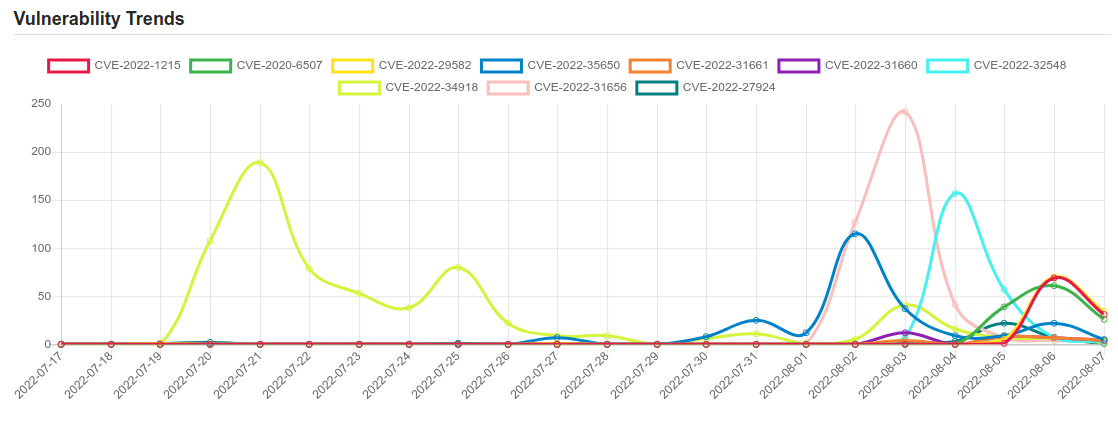Daily Vulnerability Trends: Mon Aug 08 2022

| CVE NAME | CVE Description |
| CVE-2022-31656 | VMware Workspace ONE Access, Identity Manager and vRealize Automation contain an authentication bypass vulnerability affecting local domain users. A malicious actor with network access to the UI may be able to obtain administrative access without the need to authenticate. |
| CVE-2022-27924 | Zimbra Collaboration (aka ZCS) 8.8.15 and 9.0 allows an unauthenticated attacker to inject arbitrary memcache commands into a targeted instance. These memcache commands becomes unescaped, causing an overwrite of arbitrary cached entries. |
| CVE-2022-30190 | Microsoft Windows Support Diagnostic Tool (MSDT) Remote Code Execution Vulnerability. |
| CVE-2022-2185 | A critical issue has been discovered in GitLab affecting all versions starting from 14.0 prior to 14.10.5, 15.0 prior to 15.0.4, and 15.1 prior to 15.1.1 where an authenticated user authorized to import projects could import a maliciously crafted project leading to remote code execution. |
| CVE-2022-33891 | The Apache Spark UI offers the possibility to enable ACLs via the configuration option spark.acls.enable. With an authentication filter, this checks whether a user has access permissions to view or modify the application. If ACLs are enabled, a code path in HttpSecurityFilter can allow someone to perform impersonation by providing an arbitrary user name. A malicious user might then be able to reach a permission check function that will ultimately build a Unix shell command based on their input, and execute it. This will result in arbitrary shell command execution as the user Spark is currently running as. This affects Apache Spark versions 3.0.3 and earlier, versions 3.1.1 to 3.1.2, and versions 3.2.0 to 3.2.1. |
| CVE-2022-37452 | Exim before 4.95 has a heap-based buffer overflow for the alias list in host_name_lookup in host.c when sender_host_name is set. |
| CVE-2022-35924 | NextAuth.js is a complete open source authentication solution for Next.js applications. `next-auth` users who are using the `EmailProvider` either in versions before `4.10.3` or `3.29.10` are affected. If an attacker could forge a request that sent a comma-separated list of emails (eg.: `[email protected],[email protected]`) to the sign-in endpoint, NextAuth.js would send emails to both the attacker and the victim’s e-mail addresses. The attacker could then login as a newly created user with the email being `[email protected],[email protected]`. This means that basic authorization like `email.endsWith(“@victim.com”)` in the `signIn` callback would fail to communicate a threat to the developer and would let the attacker bypass authorization, even with an `@attacker.com` address. This vulnerability has been patched in `v4.10.3` and `v3.29.10` by normalizing the email value that is sent to the sign-in endpoint before accessing it anywhere else. We also added a `normalizeIdentifier` callback on the `EmailProvider` configuration, where you can further tweak your requirements for what your system considers a valid e-mail address. (E.g.: strict RFC2821 compliance). Users are advised to upgrade. There are no known workarounds for this vulnerability. If for some reason you cannot upgrade, you can normalize the incoming request using Advanced Initialization. |
| CVE-2022-29154 | An issue was discovered in rsync before 3.2.5 that allows malicious remote servers to write arbitrary files inside the directories of connecting peers. The server chooses which files/directories are sent to the client. However, the rsync client performs insufficient validation of file names. A malicious rsync server (or Man-in-The-Middle attacker) can overwrite arbitrary files in the rsync client target directory and subdirectories (for example, overwrite the .ssh/authorized_keys file). |
| CVE-2020-1754 | In Moodle before 3.8.2, 3.7.5, 3.6.9 and 3.5.11, users viewing the grade history report without the ‘access all groups’ capability were not restricted to viewing grades of users within their own groups. |
| CVE-2022-20233 | In param_find_digests_internal and related functions of the Titan-M source, there is a possible out of bounds write due to an incorrect bounds check. This could lead to local escalation of privilege with System execution privileges needed. User interaction is not needed for exploitation.Product: AndroidVersions: Android kernelAndroid ID: A-222472803References: N/A |
| CVE-2022-26809 | Remote Procedure Call Runtime Remote Code Execution Vulnerability. This CVE ID is unique from CVE-2022-24492, CVE-2022-24528. |
| CVE-2022-35142 | An issue in Renato v0.17.0 allows attackers to cause a Denial of Service (DoS) via a crafted payload injected into the Search parameter. |
| CVE-2022-1215 | A format string vulnerability was found in libinput |
| CVE-2020-6507 | Out of bounds write in V8 in Google Chrome prior to 83.0.4103.106 allowed a remote attacker to potentially exploit heap corruption via a crafted HTML page. |
| CVE-2022-29582 | In the Linux kernel before 5.17.3, fs/io_uring.c has a use-after-free due to a race condition in io_uring timeouts. This can be triggered by a local user who has no access to any user namespace; however, the race condition perhaps can only be exploited infrequently. |
| CVE-2022-35650 | The vulnerability was found in Moodle, occurs due to input validation error when importing lesson questions. This insufficient path checks results in arbitrary file read risk. This vulnerability allows a remote attacker to perform directory traversal attacks. The capability to access this feature is only available to teachers, managers and admins by default. |
| CVE-2022-31661 | VMware Workspace ONE Access, Identity Manager and vRealize Automation contain two privilege escalation vulnerabilities. A malicious actor with local access can escalate privileges to ‘root’. |
| CVE-2022-32548 | No description provided |
| CVE-2022-34918 | An issue was discovered in the Linux kernel through 5.18.9. A type confusion bug in nft_set_elem_init (leading to a buffer overflow) could be used by a local attacker to escalate privileges, a different vulnerability than CVE-2022-32250. (The attacker can obtain root access, but must start with an unprivileged user namespace to obtain CAP_NET_ADMIN access.) This can be fixed in nft_setelem_parse_data in net/netfilter/nf_tables_api.c. |
| CVE-2022-31660 | VMware Workspace ONE Access, Identity Manager and vRealize Automation privilege escalation | CVE-2022-31660 |
A considerable amount of time and effort goes into maintaining this website, creating backend automation and creating new features and content for you to make actionable intelligence decisions. Everyone that supports the site helps enable new functionality.
If you like the site, please support us on Patreon using the button below

To keep up to date follow us on the below channels.





